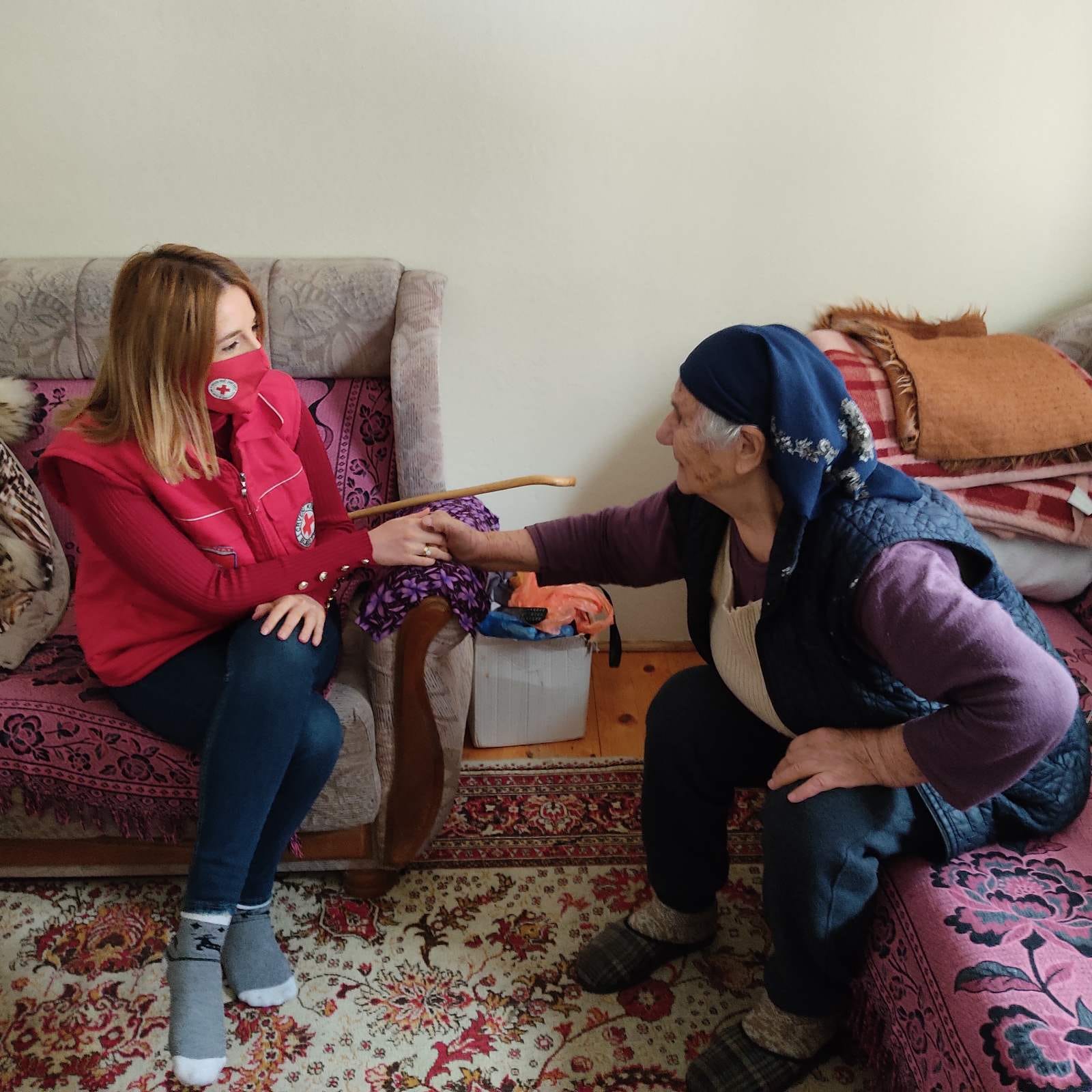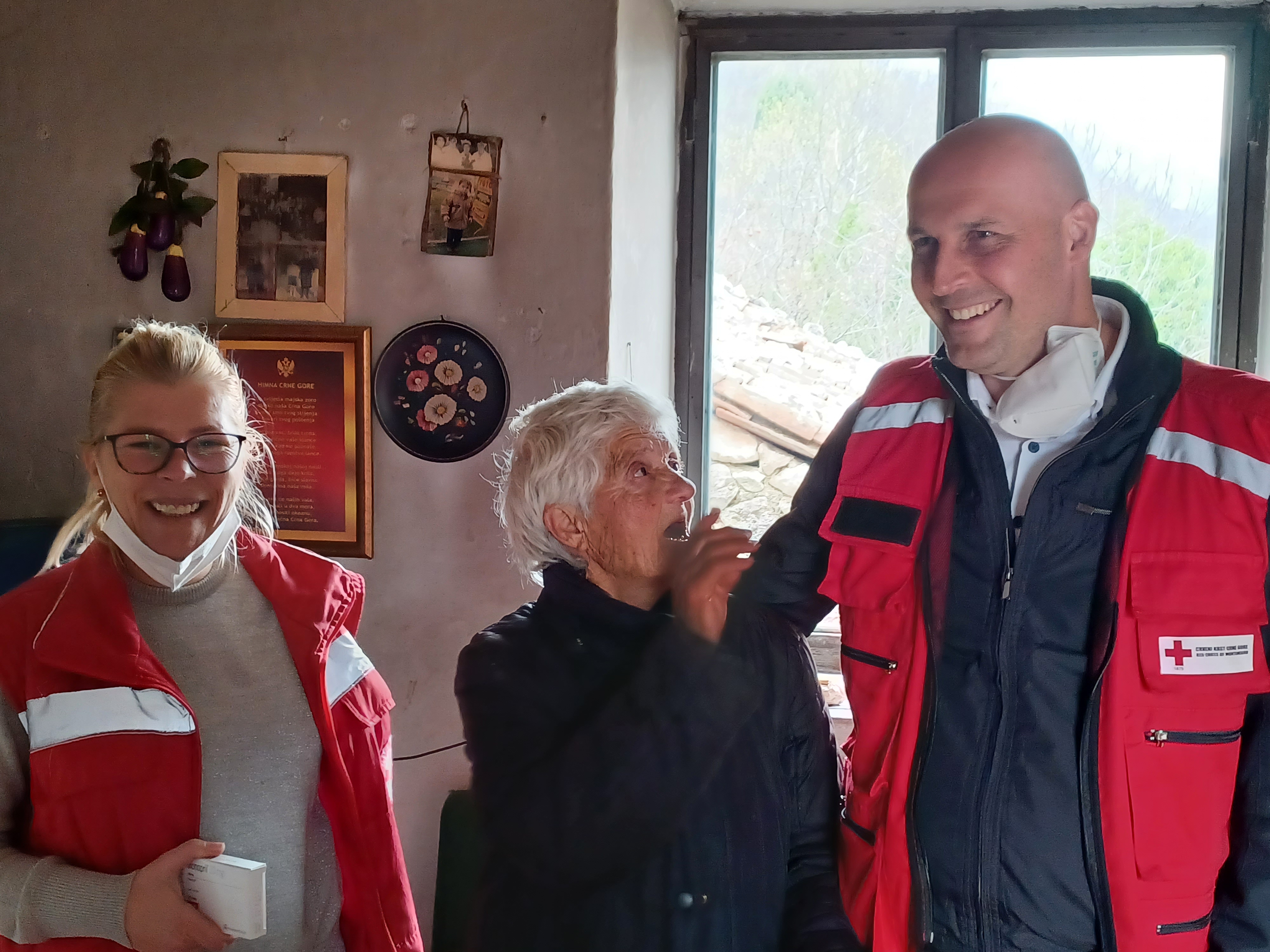Social innovative community and voluntary-based services for older people
Amid an ageing European population, long-term care services are often not affordable, available, or accessible. These issues place increasing pressure on informal carers who provide 80% of care in the EU, and of whom women represent a large majority. In addition, care work is often undervalued which results in several negative side effects for persons in need of care and their informal carers, such as mental and physical health issues. Therefore, continuous support is needed to ensure quality, coverage and reach of long-term care.
To respond to these challenges, the Austrian Red Cross, the Red Cross of Montenegro, and the Red Cross of Serbia have been implementing the I-CCC project (Innovative Community Care Centres) since October 2020. Co-funded by the programme for Employment and Social Innovation (EaSI) of the European Commission’s Directorate-General for Employment (DG EMPL) and the Austrian Development Agency, the I-CCC project aims at influencing national reforms in long-term care through developing, testing and advocating for social innovative community and voluntary-based services for older people, people with dementia and cognitive impairments, and their informal carers. Specific challenges addressed by the project are the fragmentation of health and social services, difficulties in accessing community-based and home-based care services, and growing needs of people with dementia.

Ljeposava, an 85-year-old and from Montenegro, praises the support she receives from the I-CCC home care nurse and the social workers: “They are always helpful when they come; they bring fruits, measure my blood pressure, and ask me if I need help. They also help me with the laundry. We laugh and make little jokes,” she says.
The first phase of the project included research and mapping of needs and target groups. Based on the need assessments for each community care centre, a wide range of services were developed. Services comprise advice on long-term care-related health, social, organisational or financial questions to older people in need of care and informal carers, supporting and training for informal carers and preventive home visits in Austria (Hartberg) and Montenegro, home help services in Montenegro, and respite services in Serbia, as well as health promotion and healthy ageing activities. An informal carer in Vienna after her counselling session said: “Thank you very much for your detailed and quick information. We will take your various suggestions step by step and try them with my 100-year-old mum to see what she likes more.”
The I-CCC project uses a multi-level, multi-stakeholder, and multi-methods methodology. In August 2021, a participatory assessment of community needs was carried out in each of the 6 project communities in Austria (Vienna and Hartberg), Montenegro (Bar and Bijelo Polje) and Serbia (Sombor and Pirot), following a user-centred approach. The community members were able to voice their most important health and nursing needs and which types of support services they are missing in their community. Based on the need assessment, services were developed and are now being implemented.

In addition, the project includes the monitoring and evaluation of the I-CCCs and volunteer-based services for people with dementia and cognitive impairments using an impact model and a mix of qualitative and quantitative methods of evaluation. Ivana Bulatović, an I-CCC social worker in Montenegro, shares the positive impact the project has had on her: “What I love most about my job is that at the end of the day, I have the feeling that I have helped someone”, she says. “Many of my friends moved to other countries in search of work. I am happy that I got the opportunity to stay and that I can provide myself with a decent life. I am sure that this job will open many doors for me, and I am grateful for that.”
Amid an ageing European population, long-term care services are often not affordable, available, or accessible. These issues place increasing pressure on informal carers who provide 80% of care in the EU, and of whom women represent a large majority. In addition, care work is often undervalued which results in several negative side effects for persons in need of care and their informal carers, such as mental and physical health issues. Therefore, continuous support is needed to ensure quality, coverage and reach of long-term care.
To respond to these challenges, the Austrian Red Cross, the Red Cross of Montenegro, and the Red Cross of Serbia have been implementing the I-CCC project (Innovative Community Care Centres) since October 2020. Co-funded by the programme for Employment and Social Innovation (EaSI) of the European Commission’s Directorate-General for Employment (DG EMPL) and the Austrian Development Agency, the I-CCC project aims at influencing national reforms in long-term care through developing, testing and advocating for social innovative community and voluntary-based services for older people, people with dementia and cognitive impairments, and their informal carers. Specific challenges addressed by the project are the fragmentation of health and social services, difficulties in accessing community-based and home-based care services, and growing needs of people with dementia.
Ljeposava, an 85-year- old and from Montenegro, praises the support she receives from the I-CCC home care nurse and the social workers: “They are always helpful when they come; they bring fruits, measure my blood pressure, and ask me if I need help. They also help me with the laundry. We laugh and make little jokes,” she says.
The first phase of the project included research and mapping of needs and target groups. Based on the need assessments for each community care centre, a wide range of services were developed. Services comprise advice on long-term care-related health, social, organisational or financial questions to older people in need of care and informal carers, supporting and training for informal carers and preventive home visits in Austria (Hartberg) and Montenegro, home help services in Montenegro, and respite services in Serbia, as well as health promotion and healthy ageing activities.
An informal carer in Vienna after her counselling session said: “Thank you very much for your detailed and quick information. I find the feeling for a 100-year-old woman you don’t know just great. We will take your various suggestions step by step and try with mum what appeals to her most.”
The I-CCC project uses a multi-level, multi-stakeholder, and multi-methods methodology. In August 2021, a participatory assessment of community needs was carried out in each of the 6 project communities in Austria (Vienna and Hartberg), Montenegro (Bar and Bijelo Polje) and Serbia (Sombor and Pirot), following a user-centred approach. The community members were able to voice their most important health and nursing needs and which types of support services they are missing in their community. Based on the need assessment, services were developed and are now being implemented.
In addition, the project includes the monitoring and evaluation of the I-CCCs and volunteer-based services for people with dementia and cognitive impairments using an impact model and a mix of qualitative and quantitative methods of evaluation.
Ivana Bulatović, an I-CCC social worker in Montenegro, shares the positive impact the project has had on her: “What I love most about my job is that at the end of the day, I have the feeling that I have helped someone”, she says. “Many of my friends moved to other countries in search of work. I am happy that I got the opportunity to stay and that I can provide myself with a decent life. I am sure that this job will open many doors for me, and I am grateful for that.”
The I-CCCs in Austria, Montenegro and Serbia now provide integrated services at the local level that maintain the functional capacities of older people, foster healthy ageing and support informal carers while creating links between health and social care.. Thanks to the project, more than 1000 older people and people with support needs received counselling on long-term care topics; around 1600 preventive home visits were facilitated, reaching more than 200 people. 179 persons benefitted from a tablet-based training in over 6000 sessions. Around 100 trainings for informal carers were realized with more than 600 participants, and 642 informal carers received advice online or in person. In total 170 volunteers were engaged during the project and benefitted from diverse trainings in this field.
According to the evaluation made by the NPO Competence Center, the I-CCC showed positive changes on the lives of older people who used Community Care Centre services in the three countries. Consultations and activities provided by the project increased functional abilities relevant to daily life in older age and enabled people to live healthier. Older people had access to more knowledge and information, strengthened their self-help skills and health literacy. Older people received appropriate psychological support. Volunteers organized a tablet-based training with the aim of motivating older people with dementia and cognitive impairments to be mentally and motorically active in playful ways, having a positive effect on their feelings of depressiveness. Regarding cognitive status, on average people continued in the same category and got slightly worse, but those with severe cognitive impairment showed improvement in all 3 countries.
At the end of the project, the evaluation results will be used to contribute to national policy reforms in the field of long-term care and to advocate for the development of new services. Recommendations for each country - Austria, Serbia and Montenegro – have been developed by the NPO Competence Center and they will be shared with decision makers to enhance the sustainability of the project.
Basic information
Activity name
Innovative Community Care Centres (I-CCC)
Country
Austria, Montenegro, Serbia
Duration
2020 - 2024
Partners
Austrian Red Cross, Montenegro Red Cross, Red Cross of Serbia, NPO Competence Center
URL
To learn more about the work of National Red Cross Societies in the EU to support older people and promote their inclusion in society through age-friendly communities, click here.

